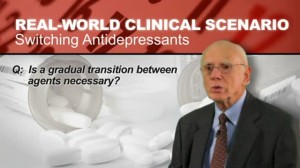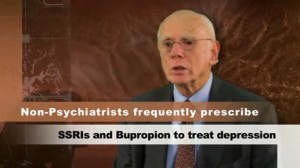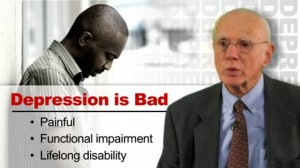NEW YORK (Reuters Health) – Patients with bipolar I disorder who haven’t been treated with a mood stabilizer and experience an episode of major depression may respond well to acute treatment with divalproex sodium, according to a report in the Journal of Clinical Psychiatry online August 24.
Dr. Joseph R. Calabrese with University Hospitals Case Medical Center, Cleveland, Ohio, and colleagues note in the report that there’s a lack of evidence for the effectiveness of antidepressant drugs for treating depression in bipolar disorder, and that antidepressant monotherapy may induce a switch into mania or hypomania.
Recent evidence suggests divalproex sodium may be useful for acute bipolar depression specifically in patients without prior exposure to mood stabilizing drugs. To test this, the researchers conducted a 6-week trial involving 54 subjects with bipolar I or II disorder and a major depression episode. About two-thirds had rapid cycling disorder, and scores on the Montgomery-Asberg Depression Rating Scale (MADRAS) at baseline were 28.9, indicating high-moderate severity.
The patients were randomly assigned to receive divalproex sodium or placebo. Only 13 patients in each arm completed the study, the others withdrawing mainly for lack of efficacy.
Nonetheless, the authors report, patients on divalproex had significantly greater improvement in MADRAS scores than those on placebo from weeks 3 through 6. “The mean change in MADRAS total score for divalproex over placebo was 4.32.”
Specifically, 10 of 26 patients (38.5%) in the divalproex group met response criteria, compared with 3 of 28 (10.7%) of those given placebo.
The benefit was mainly seen in those with bipolar I disorder, with a lack of distinction between active treatment and placebo in patients with bipolar II. “More depression, the less likely to respond to divalproex,” Dr. Calabrese commented via email.
Asked why the apparent efficacy only in patients not previously treated with a mood stabilizer, he said, “Probably because treatment-naive patients are more mood stabilizer-responsive, which is consistent with my clinical experience,”
The most common side effects reported were nausea, increased appetite, diarrhea, dry mouth and cramps.
Concluding, Dr. Calabrese advised: ”The main message is, get them early and they respond to treatment much better. It’s not about the treatment. It’s about getting them early in the natural course of the illness.”
The study was supported by Abbott Laboratories and the National Institute of Mental Health.
Reference:
J Clin Psychatry 2010.




